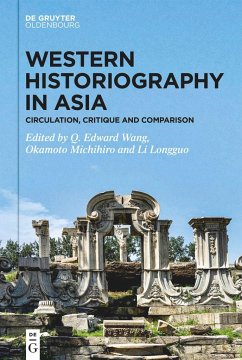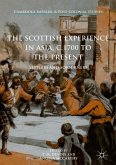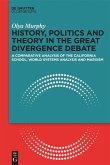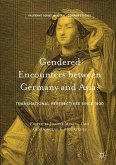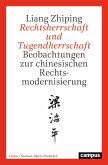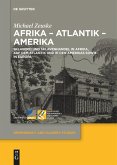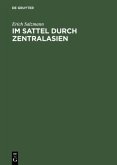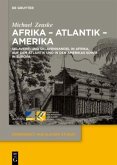This volume provides a unique and critical perspective on how Chinese, Japanese and Korean scholars engage and critique the West in their historical thinking. It showcases the dialogue between Asian experts and their Euro-American counterparts and offers valuable insights on how to challenge and overcome Eurocentrism in historical writing.
Hinweis: Dieser Artikel kann nur an eine deutsche Lieferadresse ausgeliefert werden.
Hinweis: Dieser Artikel kann nur an eine deutsche Lieferadresse ausgeliefert werden.
"The traditional notion that history was exclusively the invention of European and Near Eastern cultures has been debunked for some time, as scholarship on the rich traditions of other parts of the world such as Central, East, and South and Southeast Asia has become more widely available in Western languages. We also know that East Asian historiography, in particular, has, since the last decades of the nineteenth century, adopted many Western methods and theories. But the extent and profundity of this transference has till recently remained unclear. The editors and authors of this wide-ranging volume of essays tackle this question from several angles, and maintain a critical perspective on the tradition and transformation of Western historical practices from the ancient to modern times. Collectively, they provide a distinctively East Asian, rather than European, interpretation of the ways in which the historical culture of Europe and its direct offshoots has influenced, and in turn been influenced by, Japanese, Chinese and Korean historical writing and thought from the time of B.G. Niebuhr and Leopold von Ranke to the more recent debates about postmodernism, memory, and the ethical debts that the present owes to the past."-Daniel Woolf, Queen's University, Kingston, Ontario, Canada
"This highly important volume fills a significant gap in the current literature on the history and theory of historiography. Bringing together some of the leading historians based in East Asia, it grants insights into the rich intellectual environments and vivid discussions that characterize the study of Western historiographical traditions in that region. Some chapters also correspond to the controversial debates on schools like social history or post-colonialism within Chinese-, Japanese and Korean-speaking academic communities. This volume is an important step towards rendering our understanding of Western historiography both more encompassing and at the same time decentered. It is a must-read for all scholars and students interested in the study of historiography."-Dominic Sachsenmaier, Georg-August-Universität Göttingen, Germany
"This highly important volume fills a significant gap in the current literature on the history and theory of historiography. Bringing together some of the leading historians based in East Asia, it grants insights into the rich intellectual environments and vivid discussions that characterize the study of Western historiographical traditions in that region. Some chapters also correspond to the controversial debates on schools like social history or post-colonialism within Chinese-, Japanese and Korean-speaking academic communities. This volume is an important step towards rendering our understanding of Western historiography both more encompassing and at the same time decentered. It is a must-read for all scholars and students interested in the study of historiography."-Dominic Sachsenmaier, Georg-August-Universität Göttingen, Germany

